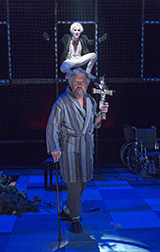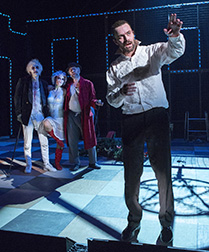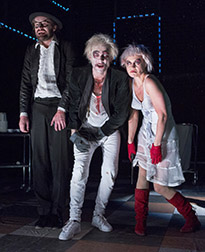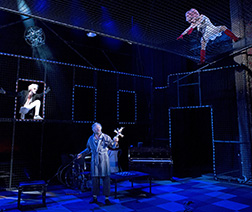By Lucy Komisar

This avant garde take on the Faust story at BAM is by turns inventive, surreal, quirky, gimmicky, tedious, diverting and fascinating. Inspired by the works of Goethe and Marlowe, it was produced and written collaboratively by members of the Vesturport Theatre and the Reykjavik City Theatre of Iceland. Their devil Mephisto (Magnus Jonsson) starts out looking like a moribund Andy Warhol and ends up channeling a hollow-faced David Bowie.
Here Johann (Thorsteinn Gunnarsson), the old man who will make a pact with the devil, is a retired actor instead of a professor. Attired in a bathrobe and walking with a cane, he lives in an old age home where he has become enamored of a young nurse, Greta (Unnur Osp Stefansdottir). He has never played Faust and is encouraged by other residents to do the part.
It‘s Christmas and the radio plays hokey songs as Valentin (Runar Freyr Gislason), a nurse who is Greta‘s brother, leads a routine of syncopated turning wheel-chairs. It‘s clear this is not a normal Faust play.

Mephisto breaks out of his Warhol disguise by pulling off pieces rubbery flesh to reveal a white face and red eyes, though the unruly mop of white hair stays the same. He offers Johann a deal to sell his soul for the chance of living any moment of his choice. Of course, what Johann wants is to be young, handsome and Greta‘s lover.
The deal is done when buzzing electric current passes between Johann and Mephisto‘s young aide, Asmodeus (Bjorn Hlynur Haraldsson). Suddenly souls switch bodies.
The romance between young Johann and Greta is blocked by the nasty brother Valentin, who appears in the original texts in a duel that doesn’t occur here.
This is all supposed to take place during Christmas, but it‘s more like Halloween. Mephisto wears a blood-spotted undershirt and long white underwear. He speaks in hoarse tones or shouts. He has the energy and force of a great sexual animal.

His aide Lilith (Nina Dogg Filippusdottir), described as Adam‘s first wife who left him after refusing to take the bottom position, has a voice that is alternately squeaky and growly, wears a blonde fright wig, and is attired in a white bra and slip, red boots and gloves. Rather cynical, when Johann declaims about love, she declares, “You sound like a soapy teenager.”
But as good as these actors are, the real star of the production is the special effects. Mephisto and the other characters spend a good deal of time running and jumping across a net stretched over the orchestra. Sometimes they are shot into the net from somewhere near the balcony, and the space billows with smoke. Hell is trap door out of which colored light and smoke comes. Sex is portrayed as Greta and the young Johann twisting from a rope hanging from the ceiling. (The set is by Axel Johannesson.)
Other denizens of the underworld who scamper across the net are dressed in white underwear and black cutaway coats. (Costumes are by Filippia Elisdottir.)

The director‘s blocking takes on a whole new dimension. Still, if you‘re going to believe in pacts with the devil, why not banish gravity as well?
There are lots of hokey pronouncements and puns. “I am a thing of evil, who works for the greater good.” And “Get us in front of an audience and we‘re demons.” There‘s a remark about Jesus Christ. Lilith says, “Is he coming?”
In a talk-back after one performance, director Gisli –rn Gadarsson explained that the question posed by the play was, “Is there a moment in life worth selling your soul for? At the end he‘s found love and meaning in his own life and asks for another chance. We leave it open whether he is heard or not.”
Curiously, Gadarsson explained that “One of reasons for the net was to bring more action to people in back rows.” Also, he said, the claustrophobic effect of the net represented the imprisoning idea of old folks‘ homes. He said he had worked in an old age home. “They are on the net trying to get away.”
Final judgment: the production is hokey, often entertaining, and not great art.
“Faust: A Love Story.” Inspired by Goethe, Christopher Marlowe, and earlier sources. Written by Nina Dögg Filippusdottir, Gsli –rn Gardarsson, Carl Grose, Björn Hlynur Haraldsson, and Vikingur Kristjansson. Directed by Gsli –rn Gardarsson. Vesturport Theatre and Reykjavk City Theatre at Brooklyn Academy of Music Harvey Theatre, 651 Fulton Street, Brooklyn, NY. (Nevins St. stop of 2,3,4,5 trains) 718-636-4100. Opened Dec 12, 2012; closes Dec 16, 2012. 12/16/12.

